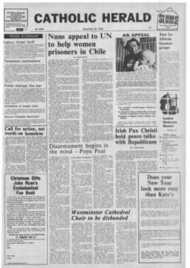Page 2, 27th December 1974
Page 2

Report an error
Noticed an error on this page?If you've noticed an error in this article please click here to report it.
Tags
Share
Related articles
Told To Leave Sudan
Archbishop Haddad Calls For An Awakeniag Of Conscience To...
Jesuit Magazine Condemns American Aggression
Diplomat Seeks Peace In Mid East
Poland And Palestine 'affinities' Stressed
Jesuit says U.S. plans imply Mid East action
From JOHN MAHER in WASHINGTON An American Jesuit who is based in the Lebanon said here that the "unthinkable" possibility of United States military intervention in the Middle East was implicit in contingency plans to guarantee continued supplies of oil from that region.
The Jesuit, Fr Joseph L. Ryan, a member of the Centre for the Study of the Modern Arab World at St Joseph's University, Beirut, quoted reports in the October 7 issue of Newsweek Magazine and the December 2 issue of US News World Report that American policy-makers were discussing the possibility of armed action by the United States in the Middle East if the oil crisis became unmanageable.
"This kind of talk needs to be publicly challenged," Fr Ryan said. Pointing out that United States soldiers would have to seize and hold Arab oil installations, he asked: "Would the United States Defence Department foresee taking on the whole Arab world and expect no American casualties?"
In an interview here as he ended a two-month lecture tour at colleges and universities in the United States, Fr Ryan contended that peace in the Middle East was not possible unless Israel withdrew from the territories occupied in the 1967 war and unless Israel recognised the rights of Palestinian Arabs.
"The recognition of Palestinian rights today involves the establishment at the request of the Palestinians of a West Bank-Gaza State, distinct from Jordan and Israel," Fr Ryan said. "Israel is bitterly opposed to this," he added.
Israel's opposition to the establishment of such a Palestinian State, the Jesuit said, had been expressed in the expulsion or arrest, especially the arrest without trial, of large numbers of West Bank leaders in the last year.
"Some Israeli Jews," he said, "have said that if they (the arrested West Bank leaders) are involved in security violations, the government ought to bring them to trial rather than hold them under administrative arrest. If there is no trial or charge, then the suspicion that security is not the real reason is confirmed."
Fr Ryan suggested that the real reason for the arrests was to prevent the organisation of the Palestinians for the establishment of a West Bank State.
An Israeli writer in the French publication Nomvel Observatemr maintained that the real reason for the arrests was that the West Bank leaders supported the Palestinian Liberation Organisation and the Israeli government did not want to recognise that support, Fr Ryan said.
Another reason for the arrests, the priest said, was the moderate nature of the West Bank leaders. "It is precisely because the leadership on the West Bank is so moderate that they pose a threat to the annexationist outlook of people within Israel," he said.
In addition to the establishment of a West Bank-Gaza State, Fr Ryan called for changes in Israel's treatment of Palestinian Arabs within its borders. "Palestinian Arabs in Israel have to become, in law and in fact, first-class citizens," he said.
He questioned the right of the Israeli government to take Arab land or to prevent Arabs from regaining land of which they have been deprived. He cited the long-standing controversy over the villages of Ikrit and Biram in northern Israel near the Lebanese border.
Since 1948, the villagers had been forbidden to return to their homes and land, and now the two villages stood destroyed. The Israeli government contended that security demanded the continued ban against the villagers' return.
"One of the reasons given publicly by Israeli government spokesmen for not allowing those villages to return," Fr Ryan said, "is that it would set a precedent, conceding implicitly that there are a lot of others in that situation."
Fr Ryan criticised the Israeli annexation of East Jerusalem and expropriation of Arabs there. "There has been massive development of housing for Israeli Jews in East Jerusalem," he said, adding that Dr Israel Shahak, president of the Israel League for Human and Civil Rights, had said the housing was "racially segregated — for Jews only."
"The Israelis claim they've made _provision for Arab housing," Fr Ryan said. "If you saw it, you would wonder how anyone could claim it with a straight face."
Tene Merenti' for housekeeper
Pope Paul has recognised the devoted services of Miss Gladys Woollard as a priests' housekeeper in the Diocese of Brentwood for over 20 years. Her parish priest, Fr Michael Stokes, invested her with the "Bene Merenti" medal at the 9.30 a.m. Mass on Sunday, December 8.
Eire move to end ban on contraceptives
The Eire Senate (Upper House) gave a formal first reading to a Bill which proposes to repeal the law which prohibits the sale and advertising of contraceptives.
The Bill proposes to make contraceptives available on a limited basis, mainly through clinics run by local authorities.
blog comments powered by Disqus









